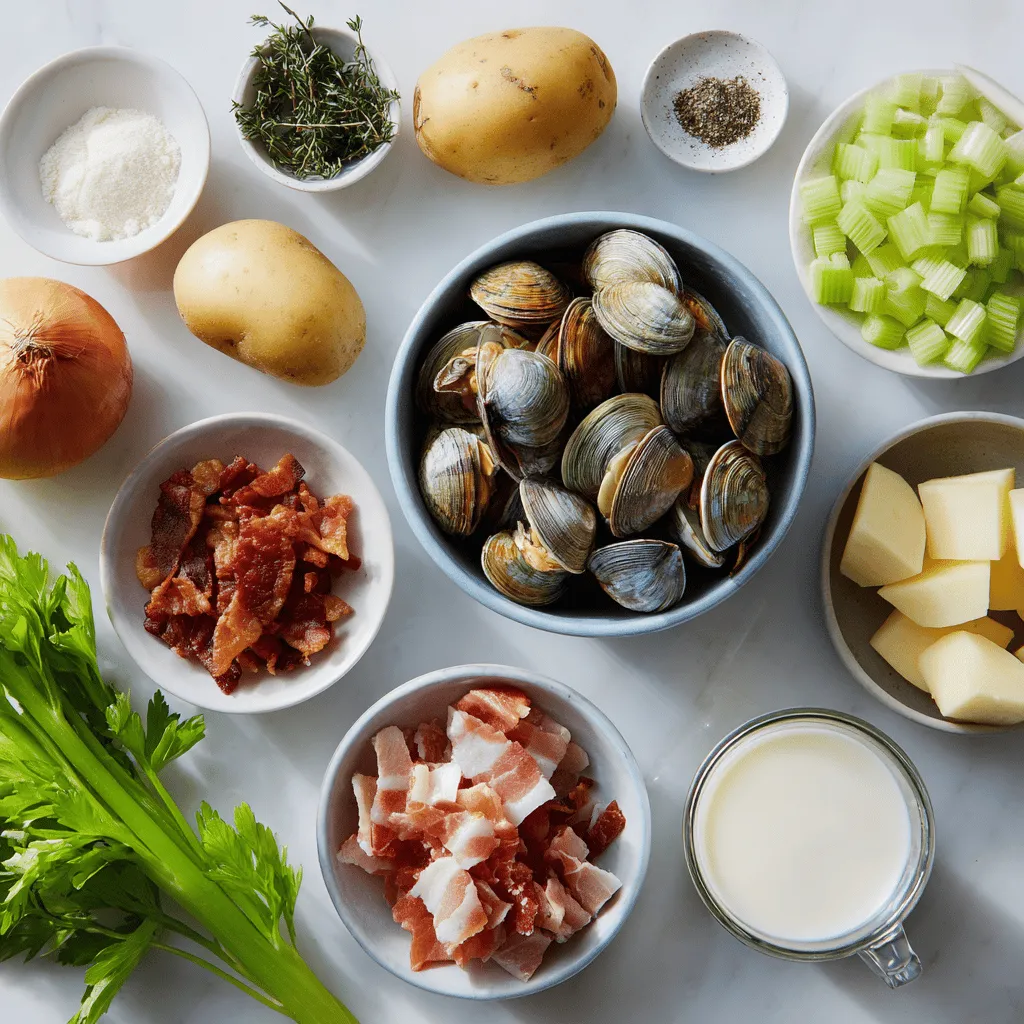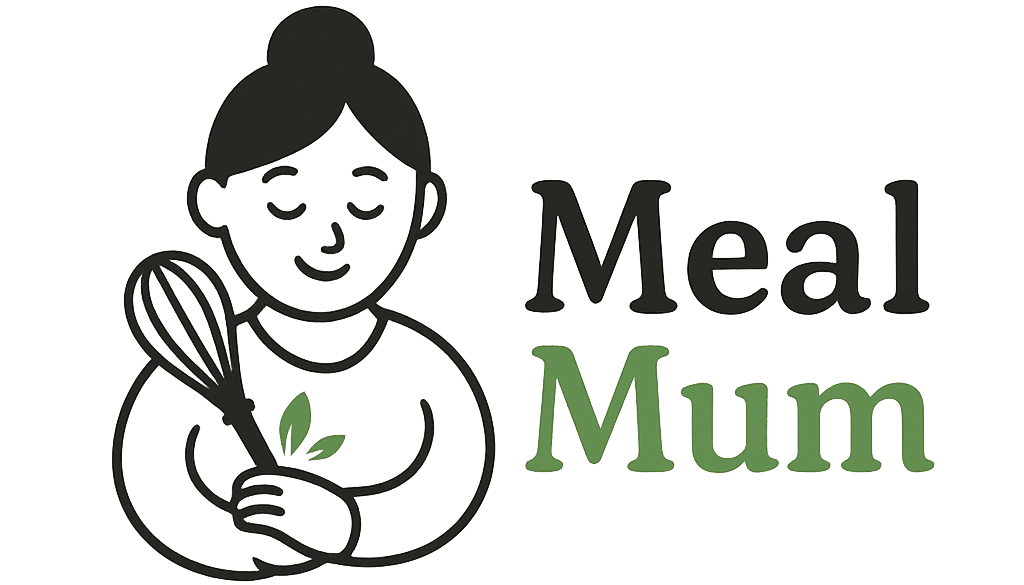Introduction
New England Clam Chowder is more than just a dish; it’s a beloved comfort food that warms the heart and soul. Originating from the coastal regions of New England, this creamy chowder showcases the rich bounty of the sea, making it a staple in local cuisine. Its hearty texture and savory flavors have made it a favorite among seafood lovers and those seeking a taste of coastal life.
The cultural significance of clam chowder in New England cannot be overstated. It embodies the region’s maritime heritage, reflecting the deep connection between the local community and the ocean. As you dig into a bowl of this chowder, you’re not just savoring a meal; you’re partaking in a tradition that has been cherished for generations.
What sets this classic recipe apart is its emphasis on freshness and creaminess. Using high-quality ingredients ensures a flavor profile that speaks to the essence of New England. Whether you’re enjoying it on a chilly evening or serving it at a family gathering, this clam chowder is bound to impress.
Recipe Overview
– Total Time: 1 hour
– Servings: 4
– Difficulty: Easy
Ingredients
– 2 lbs fresh clams, cleaned
– 4 slices of bacon, diced
– 1 medium onion, chopped
– 2 stalks celery, chopped
– 2 cloves garlic, minced
– 2 medium potatoes, peeled and diced
– 1 teaspoon dried thyme
– 4 cups clam juice or seafood stock
– 1 cup heavy cream
– 1 cup whole milk
– Salt and pepper to taste
– Fresh parsley for garnish

Instructions
1. In a large pot, steam the cleaned clams over medium heat until they open, about 5-7 minutes. Remove from heat and reserve the clam juice.
2. Strain the clam juice through a fine mesh sieve to remove any sand or grit, and set aside.
3. In the same pot, cook the diced bacon over medium heat until crispy. Remove the bacon and set it aside, leaving the fat in the pot.
4. Add the chopped onion and celery to the pot, sautéing until the onion becomes translucent, about 5 minutes.
5. Stir in the minced garlic and dried thyme, cooking for an additional minute until fragrant.
6. Add the diced potatoes and reserved clam juice to the pot. Bring to a gentle simmer and cook until the potatoes are tender, about 15 minutes.
7. Stir in the heavy cream and whole milk, allowing the chowder to heat through without boiling.
8. Chop the steamed clams and add them back to the pot along with the cooked bacon. Season with salt and pepper to taste.
9. Serve hot, garnished with fresh parsley.
Understanding the Ingredients
Fresh Clams vs. Canned Clams: Pros and Cons
– Fresh clams offer superior flavor and texture.
– Canned clams provide convenience and longer shelf life.
– Nutritional benefits include high protein and essential minerals.
The Role of Clam Juice and Seafood Stock
– A good base enhances flavor depth.
– Choose quality store-bought or make homemade stock for best results.
Bacon: The Flavor Enhancer
– Crispy bacon adds a savory richness.
– Vegetarian alternatives include smoked tempeh or mushrooms.
Aromatics that Build Flavor
– Onion, celery, and thyme contribute to the chowder’s rich taste.
– Fresh herbs elevate the overall flavor profile.
Dairy Components: Cream and Milk
– Heavy cream creates a luxurious texture.
– Lactose-free options include coconut milk or almond milk.

Tips for Achieving the Perfect Sauté to Enhance Flavors
When preparing New England Clam Chowder, the sautéing process is crucial for building a strong flavor base. Start by heating your pot over medium heat and adding a generous amount of butter or olive oil.
The Importance of Forming a Roux for Thickening the Chowder
Creating a roux is essential for achieving the desired thickness in your chowder. Cook equal parts flour and fat (butter is preferred) until it turns a light golden color. This not only thickens the chowder but also adds a rich, nutty flavor.
Building the Chowder: Layering Flavors
To create a complex and satisfying chowder, add ingredients in stages. Begin with aromatic vegetables like onions and celery, followed by the roux. This layering technique allows each ingredient to infuse its flavor into the chowder.
Gradual Addition of Clam Juice and How to Avoid Lumps
When adding clam juice, do so slowly while continuously stirring. This prevents lumps from forming and ensures a smooth consistency.
Cooking Potatoes to the Right Tenderness for Optimal Texture
It’s vital to cook the potatoes until they are tender but not mushy. Aim for a fork-tender texture, as they will continue to cook slightly after you remove the chowder from the heat.
Incorporating Dairy: Timing is Key
The timing of adding dairy is critical for the best results.
Importance of Reducing Heat Before Adding Dairy
Always lower the heat before introducing cream or milk to prevent curdling.
Techniques to Prevent Curdling While Maintaining Creaminess
Stirring constantly while incorporating the dairy can help maintain a creamy texture. Additionally, using room temperature dairy can further reduce the risk of curdling.
Finishing Touches: Adding Clams and Seasoning
The final steps of adding clams and seasoning are essential for achieving the perfect bowl of chowder.
When to Add Clams for Optimal Texture and Flavor
Add fresh clams just a few minutes before serving to keep them tender and flavorful.
Balancing Seasoning for a Well-Rounded Chowder
Seasoning should be adjusted at the end of cooking. Taste and add salt, pepper, and any other herbs to achieve a well-balanced flavor.
Serving Suggestions for New England Clam Chowder
Ideal Accompaniments
New England Clam Chowder can be enjoyed on its own, but there are several traditional accompaniments that enhance the meal.
Traditional Pairings Such as Oyster Crackers and Crusty Bread
Oyster crackers are a classic choice for adding a bit of crunch, while a slice of crusty bread is perfect for dipping.
Suggested Side Dishes That Complement the Chowder
Consider pairing your chowder with a light salad or a side of coleslaw to balance the richness of the dish.
Presentation Tips
Serving clam chowder in a clean, deep bowl allows the chowder to shine.
How to Serve and Garnish for an Appealing Visual
A sprinkle of fresh parsley or chives not only adds color but also freshness to the presentation.
Importance of Using Fresh Parsley as a Finishing Touch
Fresh herbs like parsley provide a burst of flavor and enhance the dish’s visual appeal.
Storage and Reheating Tips for Leftover Chowder
Best Practices for Storing Chowder
To keep your chowder fresh, store it in an airtight container.
How to Store in the Refrigerator for Freshness
Place the container in the refrigerator, where it can last for up to three days.
Freezing Options and Potential Texture Changes Upon Thawing
If you need to store chowder for longer, consider freezing it. Be aware that dairy may change in texture upon thawing, so it might be best to add cream after reheating.
Reheating Techniques
Recommended Methods for Reheating to Maintain Flavor and Texture
Reheat on the stovetop over low heat, stirring frequently to prevent sticking and burning.
Cautions Against Boiling to Preserve the Creaminess
Avoid boiling the chowder when reheating, as this can cause the dairy to separate and result in a grainy texture.
Conclusion: The Heart of New England in a Bowl
Making homemade New England Clam Chowder is a delightful experience that brings warmth and comfort. The rich flavors and creamy texture of this classic dish embody the essence of New England cuisine.
Embrace the joy of preparing and sharing this clam chowder with loved ones, and savor the satisfaction that comes from creating a meal steeped in tradition and flavor.


